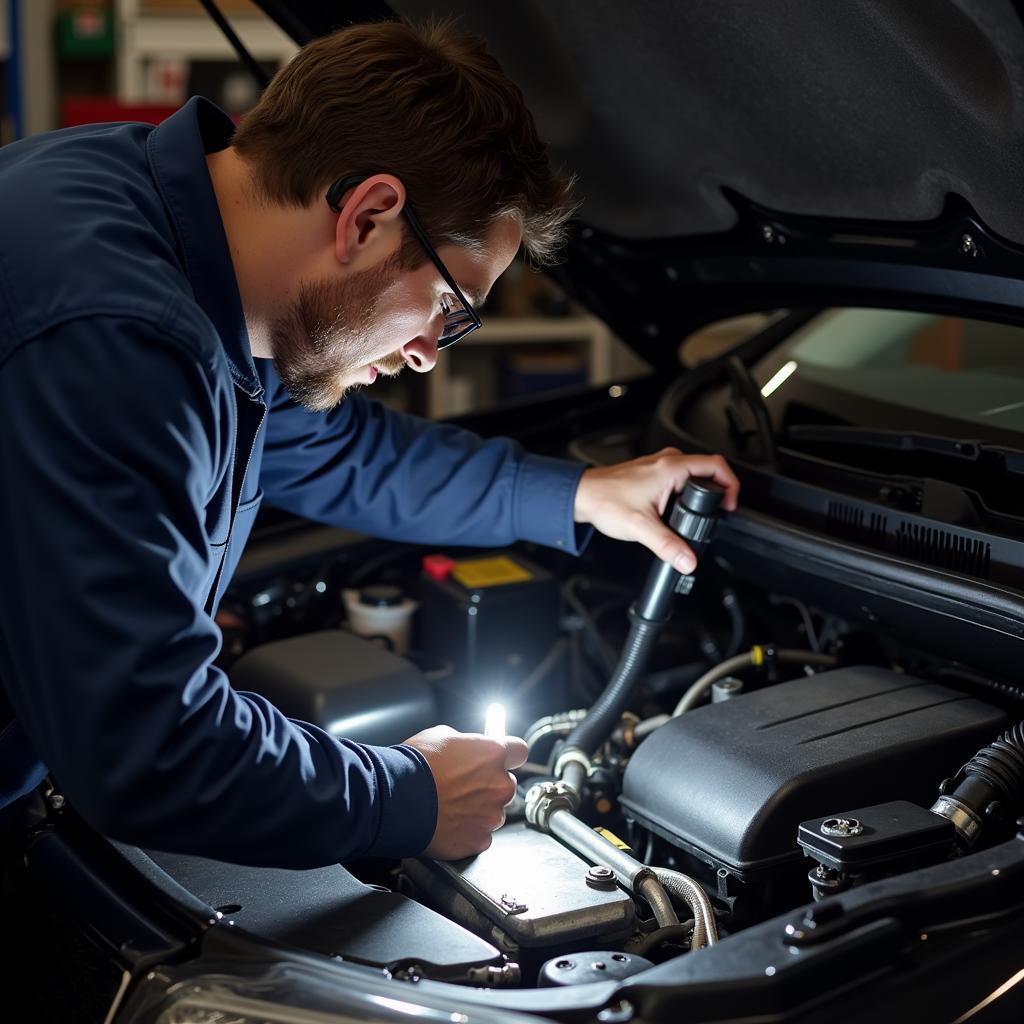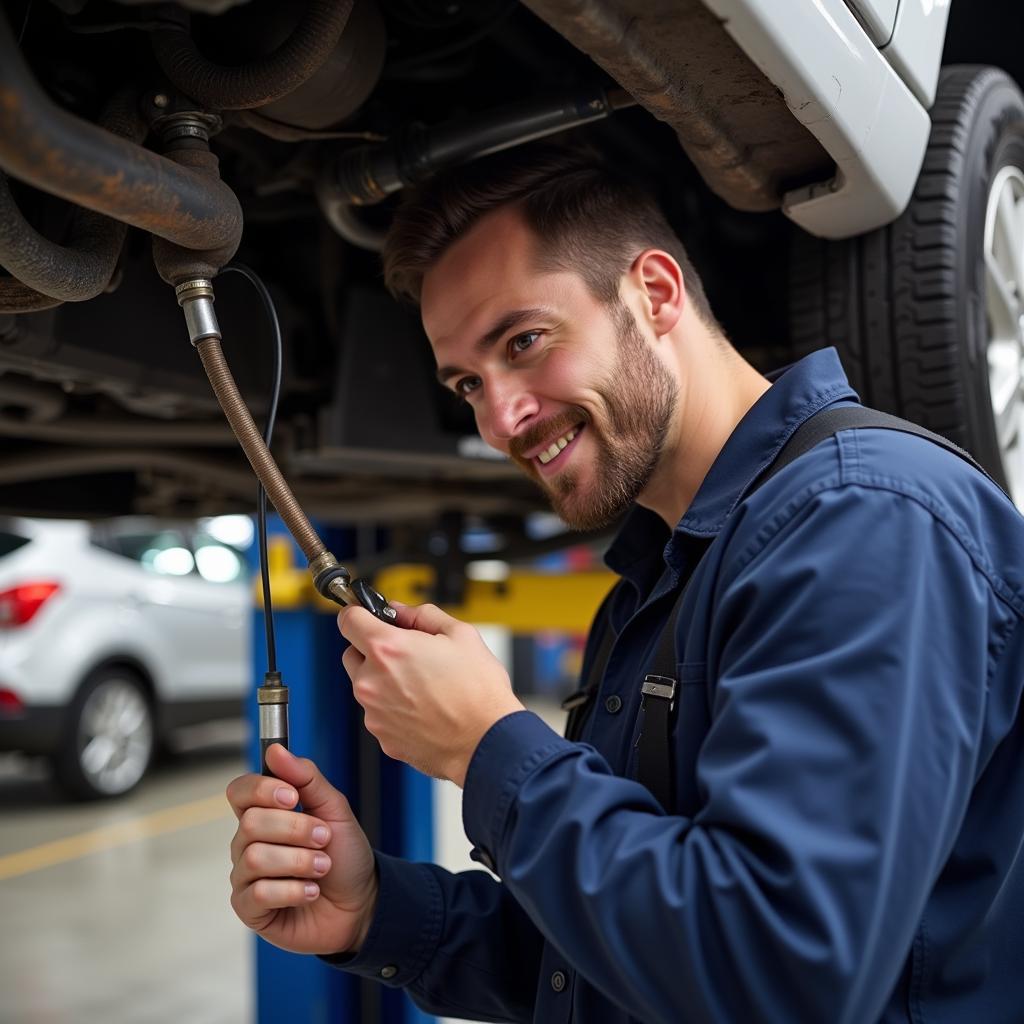A gas leak in your car is a serious issue that demands immediate attention. Understanding How To Fix A Car Gas Line Leak is crucial for both safety and preventing further damage to your vehicle. This guide will provide a comprehensive overview of diagnosing and repairing gas leaks, equipping you with the knowledge to handle this potentially hazardous situation.
 Detecting a Gas Line Leak in a Car
Detecting a Gas Line Leak in a Car
Identifying a Gas Leak
Before you can fix a car gas line leak, you need to confirm its presence. Several telltale signs indicate a fuel leak:
- Strong Gasoline Smell: This is the most obvious indicator. A persistent, strong gasoline odor, inside or outside the car, is a red flag.
- Visible Fuel Leaks: Look under your car for drips or puddles of gasoline. Inspect the fuel lines, tank, and connections for wet spots or stains.
- Hissing Sound: A hissing sound coming from the fuel system, especially when the engine is running, can indicate a leak.
- Decreased Fuel Efficiency: If you’re filling up more often than usual, a gas leak might be the culprit.
- Engine Performance Issues: A fuel leak can disrupt the fuel delivery system, causing rough idling, stalling, or difficulty starting.
If you suspect a gas leak, how to fix a leaky gas line on a car provides additional insights on addressing this issue.
Pinpointing the Leak Source
Once you’ve confirmed a leak, the next step is to locate its source. This often requires a thorough visual inspection of the fuel system components:
- Fuel Lines: Carefully examine the rubber hoses and metal lines that run from the gas tank to the engine. Look for cracks, holes, or loose connections.
- Fuel Tank: Check the tank itself for rust, punctures, or damage to the filler neck.
- Fuel Pump: Inspect the fuel pump and its connections for leaks.
- Fuel Injectors: Leaky fuel injectors can also cause a gas smell.
- Carburetor (older vehicles): If your car has a carburetor, check for leaks around its base and connections.
Remember, safety is paramount when working with gasoline. Ensure proper ventilation and avoid any open flames or sparks.
How to Fix a Car Gas Line Leak: Step-by-Step Guide
Repairing a gas leak can range from a simple fix to a more complex repair. For minor leaks in rubber hoses, you may be able to use a fuel line repair kit. For more significant leaks or damage to metal lines, replacement is often necessary.
- Safety First: Disconnect the negative battery cable before starting any repair work.
- Locate the Leak: Pinpoint the exact location of the leak using the methods described above.
- Repair or Replace: Depending on the severity and location of the leak, you’ll either repair the damaged section or replace the entire fuel line. how to fix gas leak in car offers further guidance on this topic.
- Tighten Connections: Ensure all connections are secure and properly tightened.
- Test for Leaks: After the repair, start the engine and check for any remaining leaks.
It is often best to seek professional help for any gas leak repair.
When to Call a Professional
While minor repairs can sometimes be handled by a DIY enthusiast, complex fuel system issues often require the expertise of a qualified mechanic. If you are unsure about any aspect of the repair process, or if the leak is substantial or located in a difficult-to-access area, it is crucial to consult a professional. how much to fix a vacuum leak on my car can offer insights on related car repair costs.
 Mechanic Repairing a Fuel Line Leak
Mechanic Repairing a Fuel Line Leak
“Ignoring a gas leak is like playing with fire,” says veteran automotive technician, Robert Miller. “It’s a serious safety hazard that requires prompt attention. Don’t hesitate to seek professional help if needed.”
Conclusion: Addressing a Car Gas Line Leak Effectively
Addressing how to fix a car gas line leak is crucial for maintaining your vehicle’s safety and performance. Promptly identifying and repairing fuel leaks is essential to prevent potential hazards. While minor fixes can be tackled with the right knowledge and tools, seeking professional assistance is often the safest and most effective approach for complex repairs. Contact AutoTipPro at +1 (641) 206-8880 or visit our office at 500 N St Mary’s St, San Antonio, TX 78205, United States, for expert advice and assistance. Remember, a stitch in time saves nine, especially when it comes to your car’s fuel system. how to fix car evap 99 corolla and how to fix car from burning oil offer additional resources for related car maintenance issues.
FAQ
- What is the most common cause of a gas leak? Deteriorated or damaged fuel lines and loose connections are frequent culprits.
- Can I drive my car with a gas leak? It’s highly discouraged. Driving with a gas leak is dangerous and can cause further damage.
- How much does it typically cost to fix a gas leak? The cost varies depending on the severity and location of the leak.
- Are there any temporary fixes for a gas leak? While temporary fixes exist, they are not recommended as long-term solutions. Always seek a permanent repair.
- How can I prevent gas leaks in the future? Regular vehicle maintenance and inspections can help prevent future gas leaks.
- What are the signs of a dangerous gas leak? A strong gasoline smell, visible fuel puddles, and hissing sounds are signs of a potentially dangerous leak.
- Is it safe to fix a gas leak myself? If you have the necessary skills and experience, you can attempt minor repairs. However, complex repairs are best left to professionals.





Leave a Reply